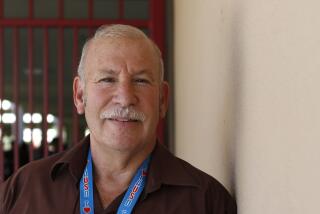4 for L.A. community college board
Where are all the knowledgeable people with a passion for bringing higher education to the masses? Too few of them are running for the board of the Los Angeles Community College District.
It’s not that the four contested seats need more candidates. Fifteen people are seeking seats in the at-large election; six are vying for one spot alone. But if the incumbents tend toward complacency about the operation of the colleges, their challengers tend toward ignorance of it. One candidate doesn’t know which incumbent he’s running against; one has never attended a board meeting; three don’t know how construction bonds work; and another says that what the colleges need most is more baseball teams. People who seek leadership of this important educational institution should do their homework.
Enrollment in Los Angeles’ nine community colleges was up 11% this academic year, to 135,000 students, and thousands more are expected to register in the fall, a natural fallout of the grim economy. Displaced workers will seek retraining; stellar students who cannot afford the University of California will start at community college; high school graduates who planned to find jobs will find that there aren’t many and that they might as well attend college and pick up new skills. It will take aggressive planning and prioritizing to find seats in the right classrooms for these adults of varied ages, backgrounds, abilities and ambitions. They deserve stronger leadership than they will get from this election. How is it that the Los Angeles Unified School District has drawn four well-versed and energetic candidates to its two open seats?
To be sure, the L.A. Community College District is better run than L.A. Unified. It deserves credit for hiring strong managers and for its new partnership with L.A. Unified that will bring college classes to high school campuses. Challengers routinely criticize the colleges’ 51% dropout rate -- slightly more than half of the students who enter with plans to take an associate’s degree never do. But a 2007 study found that statewide, 76% of community college students with degree plans drop out; by comparison, Los Angeles’ two-year colleges are doing well.
Not well enough, though, to justify the incumbents’ lack of a sense of urgency about the improvements needed. It takes students too long to get through the required course work for degree or transfer, a combination of poor counseling and a shortage of key classes. Some complaints from challengers that merit attention: a symbiotic relationship between the board and unions that tends to result in generous contracts and well-funded campaigns for incumbents; some questionable use of bond money; uneven offerings from one campus to another.
Two of the incumbents have the expertise to push the district forward, especially if they are willing to act more independently. Fortunately, the two weaker incumbents have qualified and committed challengers.
Seat 2: Angela J. Reddock. Reddock, a lawyer, was appointed to the board in 2007 and has since gained an impressive grasp of the district’s issues and governance. She deserves to win her first election over four challengers, none of whom speaks at all knowledgeably about the colleges or how money can and should be used.
Reddock has a chance in her first full term to grow more fully into her role by challenging the status quo more often, questioning whether construction money is being used efficiently and looking for ways to help more students get the courses they need.
Seat 4: Kelly Candaele. Twelve-year board member Candaele is easily the most impressive of the 15 candidates. It’s not surprising that he would have an intimate understanding of the colleges’ workings, but he also speaks authoritatively and openly about improvements that can be made, especially ensuring that students bound for four-year universities are taking the right courses toward transfer. His one opponent, Roy Burns, who nearly captured a seat on the board two years ago, recognizes that the district could improve but outlines the wrong problems, such as the graduation rate. Candaele has been a leader in forging outside partnerships and linking faculty raises to performance. He deserves another term.
Seat 6: Jozef Essavi. Incumbent Nancy Pearlman openly states that ecological issues, especially green construction, are her top priority. Environmental concerns are fine, but they are tangential to the main mission of community colleges: providing higher education to people who otherwise could not afford it.
Of her five challengers, Essavi is the strongest. He correctly identifies textbook prices as a major issue for students and has workable ideas for bringing costs down; he also poses good questions about the huge sums that have been raised for construction and how efficiently they have been spent.
Seat 7: Kurt S. Lowry. Incumbent Miguel Santiago, appointed to the board less than a year ago, speaks in generic terms about the district’s priorities and has little in the way of bold ideas or far-reaching vision. In contrast, his single challenger, Lowry, an L.A. schools administrator, has well-honed and intriguing ideas about training students in high-demand languages and setting up an environmental-jobs curriculum in conjunction with such groups as the Sierra Club. He correctly criticizes the board’s tendency to focus on construction rather than on creating academic opportunities to get students through school in two years. His willingness to question commonly accepted board practices, along with his collegial style, would make him a valuable addition to the district’s leadership.
More to Read
A cure for the common opinion
Get thought-provoking perspectives with our weekly newsletter.
You may occasionally receive promotional content from the Los Angeles Times.






